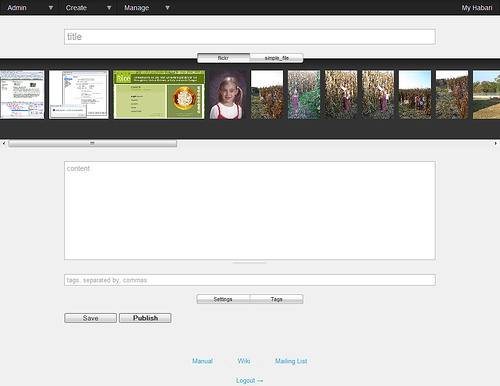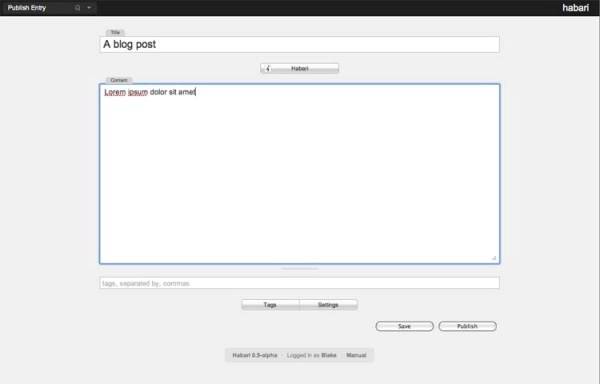WordPress may be one of the best blogging platforms around today, but that hasn’t stopped a worldwide community of developers from thinking they can do better. Desiring a more open environment where individuals can contribute and extend the project with their own work, they designed a platform called Habari to utilize a unique community participation model. Within this model, users whose contributions are consistently of a high quality are granted more privileges within the project. What has resulted from their efforts so far is a next-gen blogging platform that may eventually give WordPress a run for its money.

Some of the active developers of Habari include Michael Heilemann, Owen Winkler, Khaled Abou Alfa, Chris J. Davis, Scott Merrill, and Rich Bowen, to name a few. If you’ve been heavily involved in the WordPress community, then you may recognize some of these names already. What they, and a hundred or so other developers worldwide, are working on is a new blogging platform with a fresh design and backed up by clean code. As one developer says, “Habari is just as much a way of coding as it is a blogging platform.”
Habari Integrates With Flickr, Viddler
What’s most interesting about Habari is the way it integrates with third-party services. Instead of having to download a plugin for things like Flickr integration, for example, in Habari you can browse Flickr for a photo to add to your post just as some other blogging platforms allow you to browse your computer’s hard drive. As you search for a photo, you have the option to enter in a tag to better locate the picture you need. In this way, Habari the platform performs very much like Zemanta the plugin, an add-in which allows for a similar type of interaction.
Searching Flickr in Habari:

Another example of this platform-to-cloud integration is how Habari lets you record video blogs. From within Habari itself, you can click a record button to record a video. When finished, the video can be posted directly to Viddler’s video-sharing web site as well as to your blog itself.
Although Flickr and Viddler are the only two sites configured at the moment, they are only the beginning. Just as how a service like FriendFeed can pull in data streams from sites all over the social web, Habari will be able to access other media silos as well. And for anything that’s not supported by the platform itself, there are still plugins available just as there are in WordPress. Currently, some of the more popular plugins include Disqus comments, Feedburner integration, Twitter posting, and a lifestreaming plugin (example).
Habari Features
Also like WordPress, Habari supports static pages, Atom publishing, tagging, multiple authors, and multiple sites under one install. There are even importers for Serendipty and WordPress available to help make the transition easier.
Because Habari is still a work-in-progress to some extent, it may not be ready for the newest of bloggers just yet. One day though, the developers hope to appeal to both them and blogging experts both. They want to address the pain points that make blogging difficult for new users, but they also want to bring the focus of blogging back to content creation. That’s why the compose page is clean and simple by default (see below). They also want to focus on ways to make your blog the place where you actually blog, not the place where you have store videos and photos.
Habari wants you to just write:

It’s Not New, They Just Need Better Marketing!
The Habari Project has been around for a couple of years now, so you may have heard of it before. If not, don’t worry – you’re not alone. When one of the developers gave it a shoutout at this weekend’s Blogorlando conference, neither the speaker nor many of the audience members had ever heard of it. “Come again?”, and “How do you spell that?”, people asked. And this was a blogging conference, mind you.
If you’re looking to try a new blogging platform, Habari is ready for install today. You can learn more about the Habari Project on their homepage here: http://habariproject.org. If you’re interested in getting involved, visit the community page here: http://wiki.habariproject.org/en/Getting_Involved.

















